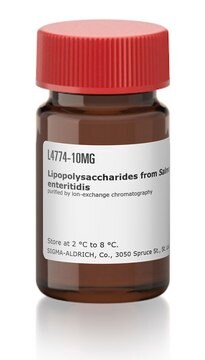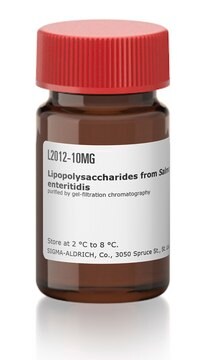L6011
Lipopolysaccharide aus Salmonella enteritidis
purified by phenol extraction
Synonym(e):
LPS
Anmeldenzur Ansicht organisationsspezifischer und vertraglich vereinbarter Preise
Alle Fotos(3)
About This Item
Empfohlene Produkte
Biologische Quelle
Salmonella enterica (Serotype enteritidis)
Qualitätsniveau
Form
lyophilized powder
Aufgereinigt durch
phenol extraction
Verunreinigungen
<3% Protein (Lowry)
Farbe
white to faint yellow
Löslichkeit
water: 0.90-1.10 mg/mL, slightly hazy to turbid, colorless to faintly yellow
Versandbedingung
ambient
Lagertemp.
2-8°C
Suchen Sie nach ähnlichen Produkten? Aufrufen Leitfaden zum Produktvergleich
Allgemeine Beschreibung
This product is phenol extracted from Salmonella enteritidis. The source strain is ATCC 13076. Lipopolysaccharide from Salmonella enteritidis is mutagenic in murine spleen cells and causes a plaque-forming response in those cells.
Anwendung
Lipopolysaccharides (LPSs) are characteristic components of the cell wall of Gram-negative bacteria. LPS and its lipid A moiety stimulate cells of the innate immune system by the Toll-like receptor 4 (TLR4).
Biochem./physiol. Wirkung
Lipopolysaccharides (LPS) are localized in the outer layer of the membrane and are, in noncapsulated strains, exposed on the cell surface. They contribute to the integrity of the outer membrane, and protect the cell against the action of bile salts and lipophilic antibiotics.
Angaben zur Herstellung
The product is soluble in water (5 mg/ml) or cell culture medium (1 mg/ml) yielding a hazy, faint yellow solution. A more concentrated, though still hazy, solution (20 mg/ml) has been achieved in aqueous saline after vortexing and warming to 70-80 oC. Lipopolysaccharides are molecules that form micelles in every solvent. Hazy solutions are observed in water and phosphate buffered saline. Organic solvents do not give clearer solutions. Methanol yields a turbid suspension with floaters, while water yields a homogeneously hazy solution.
Sonstige Hinweise
To gain a comprehensive understanding of our extensive range of Lipopolysaccharides for your research, we encourage you to visit our Carbohydrates Category page.
Ähnliches Produkt
Produkt-Nr.
Beschreibung
Preisangaben
Lagerklassenschlüssel
11 - Combustible Solids
WGK
WGK 3
Flammpunkt (°F)
Not applicable
Flammpunkt (°C)
Not applicable
Persönliche Schutzausrüstung
Eyeshields, Gloves, type N95 (US)
Hier finden Sie alle aktuellen Versionen:
Besitzen Sie dieses Produkt bereits?
In der Dokumentenbibliothek finden Sie die Dokumentation zu den Produkten, die Sie kürzlich erworben haben.
Kunden haben sich ebenfalls angesehen
G L Cooper et al.
Infection and immunity, 62(11), 4747-4754 (1994-11-01)
Newly hatched chicks were vaccinated orally with a genetically defined Salmonella enteritidis aroA candidate, strain CVL30. In chickens immunized with 10(5) or 10(9) CFU and challenged by the intravenous route with 10(8) CFU of S. enteritidis 109 Nalr at 8
Roua Abulkassim et al.
Journal of neuroimmunology, 295-296, 139-147 (2016-05-29)
Proteinase-activated receptor-2 (PAR2) is widely expressed in the CNS but whether it plays a key role in inflammation-related behavioural changes remains unknown. Hence, in the present study we have examined whether PAR2 contributes to behaviour associated with systemic inflammation using
Sofia Agelaki et al.
Infection and immunity, 70(11), 6068-6074 (2002-10-16)
Corticotropin-releasing hormone (CRH) exerts an anti-inflammatory effect indirectly, via cortisole production, and a proinflammatory effect directly on immune cells. The aim of the present work was to examine the effect of CRH on macrophage-derived cytokines both in vitro and in
L Alexopoulou et al.
The Journal of experimental medicine, 188(4), 745-754 (1998-08-26)
Lymphotoxin (LT)alpha knockout mice, as well as double LTalpha/tumor necrosis factor (TNF) knockout mice, show a severe splenic disorganization with nonsegregating T/B cell zones and complete absence of primary B cell follicles, follicular dendritic cell (FDC) networks, and germinal centers.
Huanbai Xu et al.
PloS one, 6(12), e27399-e27399 (2011-12-20)
The link between inflammation and colorectal carcinoma has been acknowledged. However, the impact of bacterial lipopolysaccharide (LPS) binding to Toll-like receptor 4 (TLR4) on chemokine receptors in human colorectal carcinoma cells still remains to be elucidated. The present study shows
Unser Team von Wissenschaftlern verfügt über Erfahrung in allen Forschungsbereichen einschließlich Life Science, Materialwissenschaften, chemischer Synthese, Chromatographie, Analytik und vielen mehr..
Setzen Sie sich mit dem technischen Dienst in Verbindung.


